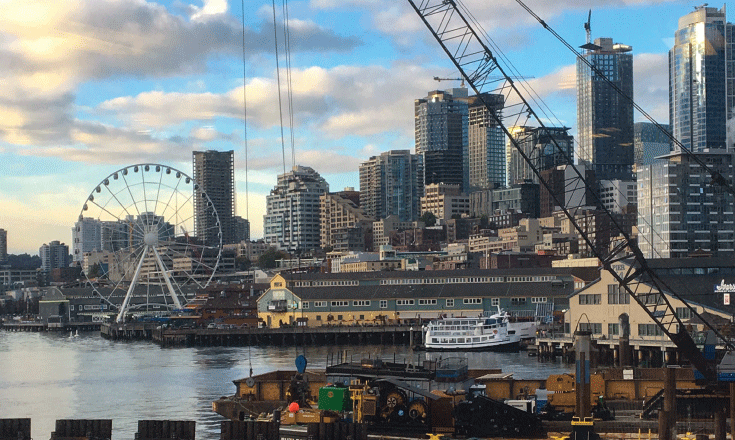Grocery store employees (among various other frontline workers) are the glue holding this country together. So it comes as no surprise that the City of Seattle would approve a $4.00 Hazard Pay raise for them. This went into effect on February 3, 2021, and is set to remain through the rest of the COVID-19 pandemic, says The Office of Labor Standards (OLS).
The pandemic continues to take its toll on individuals and families. People have lost loved ones, lost jobs, and suffered a severe increase in anxiety. In mid-July 2020, the Kaiser Family Foundation posted a tracking poll to gauge the effects of the COVID-19 pandemic on individuals’ mental health which showed that “53% of adults in the United States reported that their mental health has been negatively impacted due to worry and stress over the coronavirus.”
Despite grocery workers suffering from the same mental health decrease and susceptibility to the novel coronavirus as everyone else, they still sacrifice their safety for, granted, a paycheck, but also the ability to keep America fed. Such a sacrifice is invaluable at a time like this. The Hazard Pay raise could mean the difference between some of these employees holding on to their housing or not. However, some look at the situation through a different lens.
Jon Talton of the Seattle Times writes that “…consumers will likely pay for at least some of the added cost.” He proposes that Hazard Pay is one of several poorly thought out decisions imposed by a city council that lacks experience in business, writing “this isn’t advancing social justice. It’s civic malpractice.” Many people probably see it this way, scared they will have to pay increased prices for their groceries or that stores may cut their employee’s hours to be able to afford this pay raise.
Small businesses have been struggling to stay afloat during this extremely unprecedented time, so asking them to add a Hazard Pay bonus to their employee’s wages may not be feasible; however, grocery stores have and will continue to profit throughout the remainder of the COVID-19 emergency, so requiring that they pay their employees salaries that are a fraction higher is feasible. A report from the Brookings Institution (a Think Tank based in Washington D.C.) echoes this point by writing “we find that while top retail companies’ profits have soared during the pandemic, pay for their frontline workers—in most cases—has not.” They go on to say that “at most of the biggest retail companies in America, the gap between the struggles and sacrifices of low-wage frontline workers and the wealth they create for their employers and shareholders is wider than ever.”
“Grocery store corporations have continued to profit throughout this pandemic and paying an additional $4 an hour Hazard Pay to all their workers is the right thing to do,” said Faye Guenther, President of UFCW 21, the union representing grocery store workers,” writes Rachel Schulkin for Mayor Jenny A. Durkan’s office. She goes on to note that the Hazard Pay raise does not affect convenience stores or stores selling a limited amount of food products.
“Seattle’s law, passed last week, went into effect Wednesday. The Northwest Grocery Association and the Washington Food Industry Association (WFIA) filed their lawsuit the same day” writes David Gutman, a staff reporter at the Seattle Times. However morally right the Hazard Pay bill is, it seems that Talton was correct in saying the city council lacks experience in business and that the law may have some notable consequences. But there are companies like Trader Joe’s who willingly accepted the bill and went national with it. “Local politicians who pushed for the change are pleased by the company’s move” writes Vanessa Misciagna for King5.
The politicians who pushed for the bill should be pleased by Trader Joe’s response. Morally, many people would agree that the law as well as what the company has proceeded to do is for the best. But what about the grocery institution’s stance as well as that of stockholders?
PCC CEO Suzy Monford wrote a letter to Seattle City’s mayor Jenny Durkan regarding the Hazard Pay bill. She said that Seattle should focus on getting COVID-19 vaccines to grocery store employees quickly and asked the mayor to exempt smaller grocery chains from the law or not sign it all together.
The Brookings Institution states “in the third quarter, Walmart reported $500 million in new share repurchases, but no additional hazard pay for its workers. The cost of Walmart’s recent stock buyback was more than 40% what the company spent on hazard pay bonuses over the previous two quarters, before it ended the extra pay.” They elaborate further by stating that “… in May, Kroger reported $211 million in stock buybacks in the second quarter, and announced a new $1 billion stock buyback program in September, sending stock prices up.” And they go on to say that the company’s frontline employees have gone 181 days without hazard pay and have some of the lowest wages in the industry. A final note from the report: “Amazon and Walmart could have quadrupled the hazard pay they gave their frontline workers and still earned more profit than the previous year.”
These big-name corporations are able to afford a $4.00 Hazard Pay for their employees but as Seattle Times editorialist Jon Talton wrote further in his article, “under the “shareholder value” movement that has ruled Wall Street for the past several decades, rewarding stockholders comes first, COVID or not.” Simply put, these companies do not care about their employees as much as they do about their stockholders.
There are multiple lenses and angles through which to look at every issue. Every piece of legislation is flawed to some extent. The question here is whether the net effect on society ends up being progressive or regressive.
This is an ever-evolving situation and it can’t be disputed that grocery workers will greatly benefit from the extra $4.00 an hour. In the coming weeks, we will see if and what the consequences from this Hazard Pay raise and lawsuit are, and if it was worth it.
Author

Sonja is a Running Start student who is passionate about progressive social change. Once she goes on to university she is looking to get a bachelor’s degree in English literature studies and then a master’s degree in journalism. Her main focus in journalism is racial and other social justice issues but she loves writing about anything and everything.












Be First to Comment